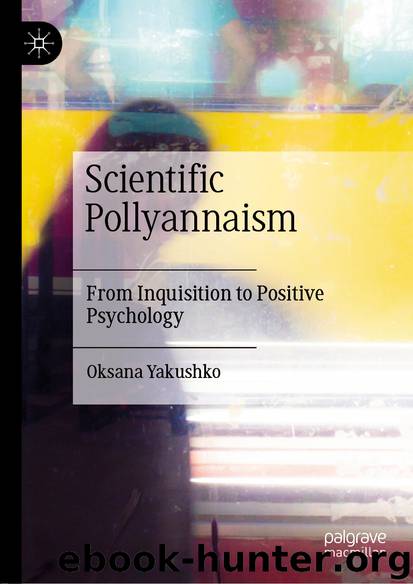Scientific Pollyannaism by Oksana Yakushko

Author:Oksana Yakushko
Language: eng
Format: epub
ISBN: 9783030159825
Publisher: Springer International Publishing
Building a New Religion from the Sciences of Happiness
Seligman , the field’s principal leader and founder, began publishing and promoting books on positivity targeted towards “normal people,” but also in order to create lucrative contracts with businesses, governments, the military as well as via online positive coaching services (Ehrenriech , 2009). According to Seligman’s (2002, 2006) books, with titles like The Learned Optimism and Authentic Happiness , positive psychology was also the promotional development product encouraged by his editor, who believed (probably correctly) that Seligman’s writings on tortured animals and people (i.e., his learned helplessness studies) were not as marketable to the general public. In his introduction to Learned Optimism Seligman (2006) quoted his agent Richard as saying: “I pray you’ll write a book about this [positivity]. They make religion out of this stuff!” (p. iii). Seligman (2006) goes on to complain about psychology’s exclusive focused on “victims” who were apparently living in the “negative” life spheres (p. xi). In contrast, he proposed a psychology for those who, like him, needed “to go from plus two to plus seven” (Seligman , 2006, p. xi).
Consistent with earlier versions of Scientific Pollyannaism , positive psychology’s focus remains on demonizing negative emotional states and enforcing the requirement of positivity in order to be considered mentally healthy. Being positive emerges here as a skill that can be acquired through the techniques of positive psychology , and mental health now requires more than supposed freedom from disordered emotions (i.e., sadness , anger ) but the perpetual presence of positive ones. According to Seligman (2011),the skills of enjoying positive emotion … are entirely different from the skills of not being depressed, not being anxious, and not being angry. These dysphorias get in the way of wellbeing, but they do not make well-being impossible; nor does the absence of sadness , anxiety, and anger remotely guarantee happiness . The takeaway lesson from positive psychology is that positive mental health is not just the absence of mental illness . … Positive mental health is a presence: the presence of positive emotion. (p. 182)
Download
This site does not store any files on its server. We only index and link to content provided by other sites. Please contact the content providers to delete copyright contents if any and email us, we'll remove relevant links or contents immediately.
The Art of Thinking Clearly by Rolf Dobelli(10490)
Mindhunter: Inside the FBI's Elite Serial Crime Unit by John E. Douglas & Mark Olshaker(9345)
Change Your Questions, Change Your Life by Marilee Adams(7786)
Nudge - Improving Decisions about Health, Wealth, and Happiness by Thaler Sunstein(7711)
Mastermind: How to Think Like Sherlock Holmes by Maria Konnikova(7350)
The Power of Now: A Guide to Spiritual Enlightenment by Eckhart Tolle(5788)
Men In Love by Nancy Friday(5245)
Altered Sensations by David Pantalony(5106)
Factfulness: Ten Reasons We're Wrong About the World – and Why Things Are Better Than You Think by Hans Rosling(4745)
The Confidence Code by Katty Kay(4265)
Thinking in Bets by Annie Duke(4229)
Man and His Symbols by Carl Gustav Jung(4138)
The Worm at the Core by Sheldon Solomon(3488)
Why Buddhism is True by Robert Wright(3457)
Liar's Poker by Michael Lewis(3452)
Three Women by Lisa Taddeo(3436)
The Inner Life of Animals by Peter Wohlleben(3321)
Descartes' Error by Antonio Damasio(3280)
How Music Works by David Byrne(3272)
